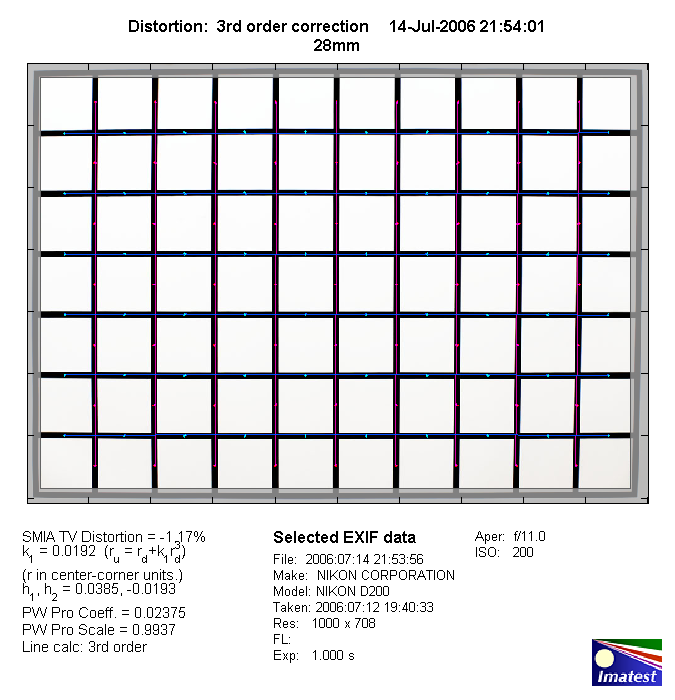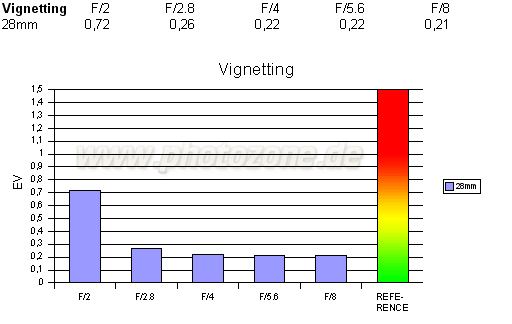|
Review by Klaus Schroiff, published July 2006
Joint lens test with Volker Mühlhaus!
Introduction
The Nikkor Ai-S 28mm f/2 found its way into the test schedule upon special request
by Volker Mühlhaus who also provided two other lenses for testing. Throughout
the years he checked out numerous Nikkors and suggested that this one is worth a
deeper look despite being a manual focus lens.
On the D200 its field-of-view is equivalent to a 42mm lens on full-frame camera so
it obviously looses much of its wide-angle character on an APS-C DSLR - it almost
behaves like a standard lens within this scope.

Note: product image kindly provided by Volker
Typical for most Ai lenses from the good 'ol times the build quality is excellent.
The broad, rubberized focus ring operates very smooth and exceptionally well
damped. You should specify the lens data using the Non-CPU Lens Data option in the
shooting menu of the D200 in order to get valid aperture information in the viewfinder as well
as in the EXIF data of your files. In this case you may even take advantage of
the color metering system. Please note that this is not possible neither on the D50
nor on the D70.
| Specifications |
|---|
| Equiv. focal length | 42 mm (full format equivalent) |
| Equiv. aperture | f/3 (full format equivalent, in terms of depth-of-field) |
| Optical construction | 9 elements in 8 groups |
| Number of aperture blades | 7 |
| min. focus distance | 0.25 m (max. magnification: 1:5.4) |
| Dimensions | 59 x 69 mm |
| Weight | 345 g |
| Filter size | 52 mm (non-rotating) |
| Hood | Nikon HN-1, barrel-shaped, screw-in type |
| Other features | CRC - close range correction |
Distortions
The Nikkor Ai-S 28mm f/2 shows only a moderate degree (~1.2%) of barrel distortions which
is slightly less than most 28-xxx zoom lenses at 28mm.

The chart above has a real-world size of about 120x80cm.
Vignetting
Regarding its age the Nikkor is naturally a full-frame lens with the usual
sweet spot advantage when used on an APS-C DSLR.
Nonetheless vignetting is still quite pronounced (~0.7EV) at wide open aperture
but from f/2.8 and up vignetting is no longer field-relevant.

MTF (resolution)
The MTF performance of the Nikkor Ai-S 28mm f/2 is still top notch by today's
standards. In fact it is about as good as it gets at medium aperture settings
where it can rival the best lenses tested to date. At f/2 the center performance
is already very good but the border quality suffers at this setting. The contrast
performance is also reduced here. At f/2.8 there's already a substantial increase
in quality primarily at the borders reaching very good territories here.
Please note that the MTF results are not directly comparable across the different systems!
Below is a simplified summary of the formal findings. The chart shows line widths per picture height (LW/PH) which can be taken as a measure for sharpness.
If you want to know more about the MTF50 figures you may check out the corresponding Imatest Explanations
Chromatic Aberrations (CAs)
The degree of lateral chromatic aberrations (color shadows at harsh contrast transitions)
is a little mixed depending on the chosen aperture. From f/2 to f/4 CAs are quite low
and not really field-relevant. The problem increases at f/5.6 and more so at f/8 to
quite pronounced but not critical levels.
Please note that lateral CAs can be quite easily reduced or even removed via tools.

Verdict
Typical for older manual focus lenses the Nikkor Ai-S 28mm f/2 comes with an
exceptional build quality and super smooth focusing - most of today's lenses
feel cheap in comparison and the glory doesn't stop here. At medium aperture
settings the lens is capable to produce some of the highest resolution figures
tested to date. At f/2 the results are somewhat softer regarding both border
resolution and contrast. Distortions and vignetting are quite well
controlled whereas CAs could be a little lower at f/8. The lens is no longer in
production but if it fits your needs you should be easily able to find one
on the used market.
|